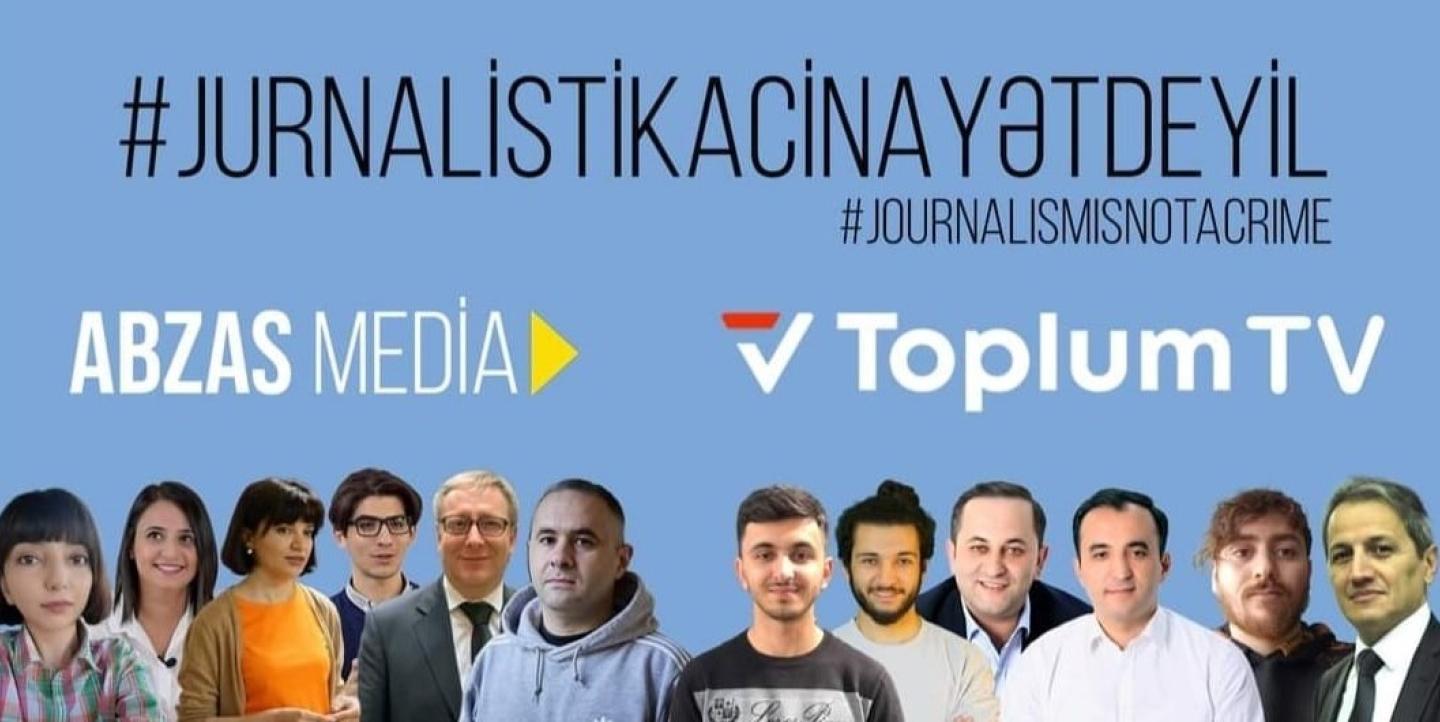Since November, more than 10 journalists in Azerbaijan from the online publications, AbzasMedia and Toplum TV, have been detained on charges of currency smuggling. Local civil society and international human rights organizations alike have denounced these arrests of independent journalists.
This has been the most significant wave of journalist detentions in the country in a decade. The crackdown has been accompanied, too, by unofficial accusations made by pro-government media that the targeted journalists were receiving illegal funding from foreign donors and benefiting from pro-Western “subversion.”
At first glance, the situation is akin to developments in Russia following the adoption of its Foreign Agent Law. With one exception: there is no such law in Azerbaijan.
Arrests of AbzasMedia reporters
AbzasMedia, which launched in 2016, has published several major investigations into corruption among high-ranking government officials in Azerbaijan over the past few years. Many of these reports have questioned the transparency of contracts issued for construction work in the region of Nagorno-Karabakh.
The arrests of AbzasMedia reporters followed a police search of the outlet’s offices, and their alleged discovery of 40,000 euros. Newsroom director Ulvi Hasanli claimed that the money had been planted by the police themselves.
Six journalists in total were arrested, including the director Hasanli, the deputy director, editor-in-chief and three reporters. They are being held in a detention center in the capital city of Baku, and a criminal case has been opened against them on charges of "smuggling committed by a group of persons by prior agreement." The journalists’ lawyers, as well as human rights activists, claim that these arrests are illegal.
"It’s pretty straightforward: you can only accuse someone of smuggling if you catch them red-handed at customs. You can't just find money at their home or office and claim that it had been smuggled in. But in this case, the police did exactly that," explained lawyer and media rights expert Alasgar Mammadli.
Searches and a sealed office
Mammadli, who is also the founder of Toplum TV, spoke to IJNet shortly before he was arrested.
The outlet’s mission is "to provide society with objective information, prioritizing human rights, liberties and freedom of expression." The channel also offers training for young journalists as part of the School of Democracy program launched by the Institute for Democratic Initiatives (IDI).
Police searched the Toplum TV newsroom in early March, sealed its offices and detained the staff members present at the time. The apartments of some of the detained journalists, as well as the offices of the Institute for Democratic Initiatives and those of the newly created political platform, Third Republic, were also searched. Akif Gurbanov, who heads the Third Republic’s board, is also a co-founder of Toplum TV and head of the IDI.
The police claimed that they found 30,000 euros in the Third Republic offices, another 3,100 euros in the apartment of journalist Ferid Ismayilov, 60,000 euros in Mammadli’s home, and the list goes on. The defendants, their family members and lawyers again say that the money had been planted.
Nine people were arrested, two of whom were later released under police supervision. All are now facing charges for “smuggling committed by a group of persons by prior agreement.” Meanwhile, Toplum TV’s YouTube channel was hacked, its name changed and all videos deleted. The channel is no longer operating.
Toplum TV's editor-in-chief Khadija Ismayilova, herself a former political prisoner, believes that the purpose of these arrests is to ensure "no free media is left in the country."
"Despite repressions, we wanted to do normal journalism as if we lived in a normal country,” she said. “But the government's actions made it clear: 'Don't be fooled, this is not a law-abiding state, this is not a normal country, you can't have free media here.’”
Allegations of illegal funding
Shortly after the arrests at AbzasMedia began, the Azerbaijani Foreign Ministry claimed that organizations registered in the U.S., Germany and France were "illegally funding the AbzasMedia news outlet," and accused those countries of interfering in Azerbaijan's internal affairs. The United States Agency for International Development (USAID), Freedom Now and New Democracy Fund were all mentioned by name; none have made any public statements on the matter.
Pro-government media have supported this crackdown on independent media, accusing Western countries led by the U.S. of creating a "wide network of agents" in Azerbaijan and attempting to destabilize the country. They claim that the West is using AbzasMedia and Toplum TV as “weak links,” and one accusation puts forth that Western donors have been financing AbzasMedia management “to carry out provocations.”
Despite the accusations, neither AbzasMedia nor Toplum TV has been officially charged with receiving illegal funding, an offense subject to administrative but not criminal punishment.
"According to the official version, these journalists received illegal grants from foreign donors and used them to fund their activities. But even if this was the case, it is inappropriate to call it smuggling. In those cases, the law prescribes appropriate administrative punishment,” said Xalid Aqaliyev, head of the Media Rights Group.
Laws impossible to comply with
In 2014, the Azerbaijani government tightened the rules for accreditation and activities of foreign NGOs, making it more difficult for them to issue grants. In the years since, local media and NGOs have found it increasingly challenging to access foreign funding. Many Western and international foundations have left Azerbaijan, unwilling to comply with the new requirements.
At the end of 2021, the government passed a new Law on Media, which prohibits the financing of Azerbaijani media by foreign individuals, organizations, governments or legal entities. Independent media, as a result, have virtually no legal means of obtaining foreign funding. Finding money inside the country – from advertisers, for example – is also difficult due to government control of the sector.
Sevda Samedova, editor of the Russian edition of Meydan TV, a German-registered news outlet covering Azerbaijan, believes that the primary issue plaguing independent media today is that the country’s laws are simply impossible to comply with: “They don’t let independent media outlets [comply with the law]. It is practically impossible to obtain a license for a media outlet critical of the authorities, foreign funding is prohibited, etc.”
Samedova recalled that independent journalists vehemently, but unsuccessfully, objected to the adoption of the Media Law: even at the time, they realized that the bill had been designed to make their lives as difficult as possible. The attacks on independent media are unfolding against the backdrop of souring relations between Azerbaijan and the West, as evidenced by the suspension of the Azerbaijani delegation from participating in the Parliamentary Assembly of the Council of Europe (PACE).
Meanwhile, the prison terms of AbzasMedia journalists have been extended. The only small victory their lawyers have managed to achieve over the past few months is securing permission for their families to visit them.
Image courtesy of Yevgeniya Markova.
This article was originally published on IJNet Russian and translated by Alexandra Tyan.


